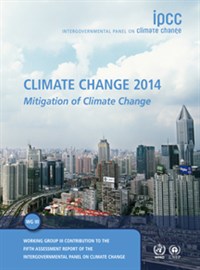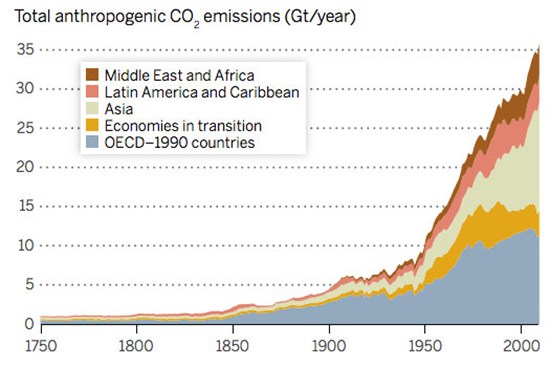Roz Pidcock
03.07.2014 | 7:30pmThe science of climate change, as expressed through the work of the Intergovernmental Panel on Climate Change (IPCC), is pretty well-established.
Over the last quarter of a century, the organisation has refined its review of the scientific literature in a series of weighty reports. Producing these reports is a complex affair requiring a huge team of volunteers, a years-long drafting process, and securing the approval of governments worldwide.
So perhaps it’s not surprising that the process sometimes gets criticised by some of those involved. This time around, some scientists complained after text about how countries should be categorised in terms of their greenhouse gas emissions got taken out of a summary.
A new issue of the journal Science, published today, features some different perspectives on what happened – and what it can teach us about where science and policy converge.
A summary for policymakers
When the IPCC releases a new report – which happens about every five or six years – it also puts together a summary of the most politically relevant conclusions. This is called the Summary for Policymakers, or SPM.
During a long and painstaking process in the week before the report’s launch, every word of the SPM has to approved by all 195 governments under the United Nations banner.
Under fire
In April, the world’s governments approved the SPM for the part of the latest IPCC report dealing with greenhouse gas trends and mitigation options.
The ink had barely dried on the summary before it came under fire from one of its own authors. And not for what the final version contained, but for what it didn’t contain.

The IPCC’s Working Group III report on mitigating climate change, part of the 5th Assessment Report (AR5)
Professor Robert Stavins, director of the Harvard Environmental Economics Program and a co-ordinating lead author on the report, wrote a blog just a few days after the SPM was published, entitled “Is the IPCC Government Approval Process Broken?”
In the blog, Stavins described his concerns about the level of political involvement. He said:
“I was surprised by the degree to which governments felt free to recommend and sometimes insist on detailed changes to the SPM text on purely political, as opposed to scientific bases â?¦ in some cases this turned out to be problematic for the scientific integrity of the IPCC Summary for Policymakers â?¦ any text that was considered inconsistent with their interests and positions in multilateral negotiations was treated as unacceptable.”
Although Stavins wasn’t complaining any political sway on the conclusions from the main report, the removal of sections from the prominent summary clearly annoyed some of its authors.
Missing text
The text that got removed looked at how different countries should be categorised by income, and how that related to their historical emissions.
The main finding was that economic growth has been the largest single driver of emissions. Or putting it another way, the most highly industrialised countries have contributed the most to climate change since the industrial revolution.
Crucially, the missing text also showed how emissions have started to change in the last decade. Industrialised countries’ emissions started to flatten off, while those from upper-middle-income countries (UMCs) grew rapidly.
This has consequences for the way we think about how to divide responsibility for dealing with climate change, says Professor David Victor, expert in international relations at the University of California, and colleagues:
“As [non-industrialised] countries’ emissions have soared, their participation in future climate agreements is essential.”

The most highly industrialised countries have contributed the most to greenhouse gas emissions since the industrial revolution though fossil fuels, flaring, cement production and land use. But emissions from emerging economies have risen rapidly in the last decade. Source: Victor et al. (2014; adapted from IPCC AR5 Technical Summary)
And therein lies the political sensitivity. Industrialised countries don’t like the implication they must do more since they bear the greatest historical responsibility. And emerging economies aren’t keen on accepting they account for most of the recent growth in emissions, since it might be disadvantageous for future negotiations.
There’s a lot of variation within those categories too, so some countries weren’t happy about generalising too widely. Factors other than income drive differences in emissions between countries, such as energy efficiency policies, for example.
Such details make for tricky politics. And when delegates couldn’t come to an agreement and time was short, the material was taken out altogether, the articles explain.
Causes for concern
If wrangling over material in the SPM is a sign of countries positioning themselves ahead of international climate negotiations in Paris next year, this suggests striking a global deal between industrialised and emerging countries could be a huge task. As Victor puts it:
“Unless both groups take concerted action, stabilising the climate will be impossible”.
Another concern is that recent events may cast a shadow on the IPCC’s remit to be policy-relevant without being policy-prescriptive. As an editorial in Science puts it:
“[S]ome fear that this redaction of content marks an overstepping of political interests”.
The SPM is meant to balance scientific and political interests, the editorial continues. But as Victor explains, the balance is a fine one to tread:
“A small number of countries can block findings that a large number of scientists working over many years with extensive review have agreed are robust.”
On solid (scientific) ground
It’s important to note the material taken out of the SPM is still in the full report, unchanged – a point Victor stresses. The chair of the working group that produced the mitigation report, Ottmar Edenhofer, echoes this point in a separate article, saying:
“Although changes were made during the government approval process, author involvement preserved consistency with the science in the underlying report â?¦ the government approved SPM remains scientifically credible.”
One solution to avoid these kind of issues is for the scope of IPCC reports to be narrowed to keep to more clear-cut scientific issues. But disentangling the IPCC’s conclusions from policy is impossible, says Victor.
A third article suggests that far from trying to distance itself from policy and politics, the IPCC should embrace the political implications of the science it presents. Professor Navroz Dubash and two other scientists – all lead authors on the mitigation report – say there’s no question of removing the government “approval” proces. They say:
“An approval process is worth preserving, as it is precisely what makes the IPCC distinct from any number of technical reports.”

